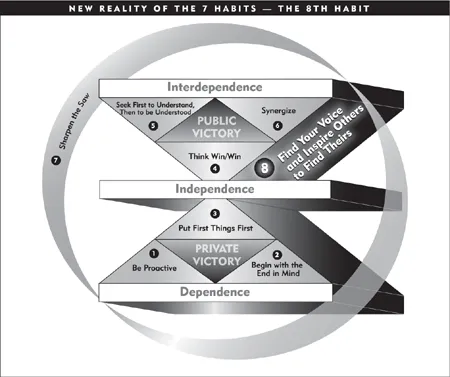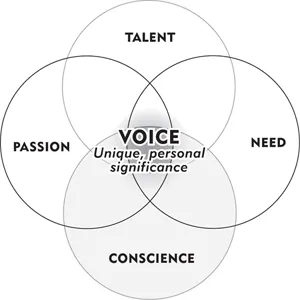![]()
Chapter 1
THE PAIN
LISTEN TO THE VOICES:
“I’m stuck, in a rut.”
“I have no life. I’m burned out—exhausted.”
“No one really values or appreciates me. My boss doesn’t have a clue of all I’m capable of.”
“I don’t feel especially needed—not at work, not by my teenage and grown children, not by my neighbors and community, not by my spouse—except to pay the bills.”
“I’m frustrated and discouraged.”
“I’m just not making enough to make ends meet. I never seem to get ahead.”
“Maybe I just don’t have what it takes.”
“I’m not making a difference.”
“I feel empty inside. My life lacks meaning; something’s missing.”
“I’m angry. I’m scared. I can’t afford to lose my job.”
“I’m lonely.”
“I’m stressed out; everything’s urgent.”
“I’m micromanaged and suffocating.”
“I’m sick of all the backstabbing politics and kissing up.”
“I’m bored—just putting in my time. Most of my satisfactions come off the job.”
“I’m beat up to get the numbers. The pressure to produce is unbelievable. I simply don’t have the time or resources to do it all.”
“With a spouse who doesn’t understand and kids who don’t listen or obey, home is no better than work.”
“I can’t change things.”
THESE ARE THE VOICES of people at work and at home—voices of literally millions of parents, laborers, service providers, managers, professionals and executives all over the world who are fighting to make it in the new reality. The pain is personal, and it’s deep. You may relate with many of the statements yourself. As Carl Rogers once said, “What is most personal is most general.”1
Of course some people are engaged, contributing and energized in their work . . . but far too few. I frequently ask large audiences, “How many agree that the vast majority of the workforce in your organization possesses far more talent, intelligence, capability and creativity than their present jobs require or even allow?” The overwhelming majority of the people raise their hands, and this is with groups all over the world. About the same percentage acknowledge that they are under immense pressure to produce more for less. Just think about it. People face a new and increasing expectation to produce more for less in a terribly complex world, yet they are simply not allowed to use a significant portion of their talents and intelligence.
In no way is this pain more clearly or practically manifest in organizations than in their inability to focus on and execute their highest priorities. Using what we call the xQ (Execution Quotient) Questionnaire*, Harris Interactive, the originators of the Harris Poll, recently polled 23,000 U.S. residents employed full time within key industries† and in key functional areas.‡ Consider a few of their most stunning findings:
• Only 37 percent said they have a clear understanding of what their organization is trying to achieve and why.
• Only 1 in 5 was enthusiastic about their team’s and organization’s goals.
• Only 1 in 5 workers said they have a clear “line of sight” between their tasks and their team’s and organization’s goals.
• Only half were satisfied with the work they have accomplished at the end of the week.
• Only 15 percent felt that their organization fully enables them to execute key goals.
• Only 15 percent felt they worked in a high-trust environment.
• Only 17 percent felt their organization fosters open communication that is respectful of differing opinions and that results in new and better ideas.
• Only 10 percent felt that their organization holds people accountable for results.
• Only 20 percent fully trusted the organization they work for.
• Only 13 percent have high-trust, highly cooperative working relationships with other groups or departments.
If, say, a soccer team had these same scores, only four of the eleven players on the field would know which goal is theirs. Only two of the eleven would care. Only two of the eleven would know what position they play and know exactly what they are supposed to do. And all but two players would, in some way, be competing against their own team members rather than the opponent.
The data is sobering. It matches my own experience with people in organizations of every kind all around the world. Despite all our gains in technology, product innovation and world markets, most people are not thriving in the organizations they work for. They are neither fulfilled nor excited. They are frustrated. They are not clear about where the organization is headed or what its highest priorities are. They are bogged down and distracted. Most of all, they don’t feel they can change much. Can you imagine the personal and organizational cost of failing to fully engage the passion, talent and intelligence of the workforce? It is far greater than all taxes, interest charges and labor costs put together!
WHY AN 8TH HABIT?
The world has profoundly changed since The 7 Habits of Highly Effective People was published in 1989. The challenges and complexity we face in our personal lives and relationships, in our families, in our professional lives, and in our organizations are of a different order of magnitude. In fact, many mark 1989—the year we witnessed the fall of the Berlin Wall—as the beginning of the Information Age, the birth of a new reality, a sea change of incredible significance—truly a new era.
Many have asked whether the 7 Habits are still relevant in today’s new reality. My answer is always the same: The greater the change and more difficult the challenges, the more relevant they become. You see, the 7 Habits are about becoming highly effective. They represent a complete framework of universal, timeless principles of character and human effectiveness.
Being effective as individuals and organizations is no longer optional in today’s world—it’s the price of entry to the playing field. But surviving, thriving, innovating, excelling and leading in this new reality will require us to build on and reach beyond effectiveness. The call and need of a new era is for greatness. It’s for fulfillment, passionate execution, and significant contribution. These are on a different plane or dimension. They are different in kind—just as significance is different in kind, not in degree, from success. Tapping into the higher reaches of human genius and motivation—what we could call voice—requires a new mind-set, a new skill-set, a new tool-set ...a new habit.
The 8th Habit, then, is not about adding one more habit to the 7—one that somehow got forgotten. It’s about seeing and harnessing the power of a third dimension to the 7 Habits that meets the central challenge of the new Knowledge Worker Age. This 8th Habit is to Find Your Voice and Inspire Others to Find Theirs.
Figure 1.1
The 8th Habit represents the pathway to the enormously promising side of today’s reality. It stands in stark contrast to the pain and frustration I’ve been describing. In fact, it is a timeless reality. It is the voice of the human spirit—full of hope and intelligence, resilient by nature, boundless in its potential to serve the common good. This voice also encompasses the soul of organizations that will survive, thrive and profoundly impact the future of the world.
Figure 1.2
Voice is unique personal significance—significance that is revealed as we face our greatest challenges and which makes us equal to them.
As illustrated in Figure 1.2, voice lies at the nexus of talent (your natural gifts and strengths), passion (those things that naturally energize, excite, motivate and inspire you), need (including what the world needs enough to pay you for), and conscience (that still, small voice within that assures you of what is right and that prompts you to actually do it). When you engage in work that taps your talent and fuels your passion—that rises out of a great need in the world that you feel drawn by conscience to meet—therein lies your voice, your calling, your soul’s code.
There is a deep, innate, almost inexpressible yearning within each one of us to find our voice in life. The exponential, revolutionary explosion of the internet is one of the most powerful modern manifestations of this truth. The internet is perhaps the perfect symbol of the new world, of the Information/Knowledge Worker economy, and of the dramatic changes that have occurred. In their 1999 book, Cluetrain Manifesto, authors Locke, Levine, Searls and Weinberger put it this way:
All of us are finding our voices again. Learning how to talk to one another. . . . Inside, outside, there’s a conversation going on today that wasn’t happening at all five years ago and hasn’t been very much in evidence since the Industrial Revolution began. Now, spanning the planet via Internet and Worldwide Web, this conversation is so vast, so multifaceted, that trying to figure out what it is about is futile. It’s about a billion years of pent up hopes and fears and dreams coded in serpentine double helixes, the collective flashback déjà vu of our strange perplexing species. Something ancient, elemental, sacred, something very, very funny that’s broken loose in the pipes and wires of the twenty-first century.
. . . there are millions and millions of threads in this conversation, but at the beginning and end of each one is a human being. . . .
This fervid desire for the Web bespeaks a longing so intense that it can only be understood as spiritual. A longing indicates something is missing in our lives. What is missing is the sound of the human voice. The spiritual lure of the Web is the promise of the return of voice.2
Rather than further describe voice, let me illustrate it through the true story of one man. When I met Muhammad Yunus, founder of the Grameen Bank—a unique organization established for the sole purpose of extending microcredit to the poorest of the poor in Bangladesh—I asked him when and how he had gained his vision. He said he didn’t have any vision to begin with. He simply saw someone in need, tried to fill it, and the vision evolved. Muhammad Yunus’s vision of a povertyfree world was set in motion with an event on the streets of Bangladesh. While interviewing him for my syndicated column* on Leadership, he shared his story with me:
It all started twenty-five years ago. I was teaching economics at a university in Bangladesh. The country was in the middle of a famine. I felt terrible. Here I was, teaching the elegant theories of economics in the classroom with all the enthusiasm of a brand-new Ph.D. from the United States. But I would walk out of the classroom and see skeletons all around me, people waiting to die.
I felt that whatever I had learned, whatever I was teaching, was all make-believe stories, with no meaning for people’s lives. So I started trying to find out how people lived in the village next door to the university campus. I wanted to find out whether there was anything I could do as a human being to delay or stop the death, even for one single person. I abandoned the bird’s-eye view that lets you see everything from above, from the sky. I assumed a worm’s-eye view, trying to find whatever comes right in front of you—smell it, touch it, see if you can do something about it.
One particular incident took me in a new direction. I met a woman who was mak...


